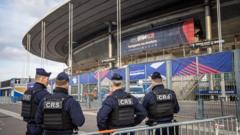As tensions rise in the aftermath of violent clashes involving Maccabi Tel Aviv fans in Amsterdam, French authorities are implementing rigorous security protocols for Thursday's UEFA Nations League match between France and Israel. Paris police have announced that 4,000 officers will oversee security efforts, with 2,500 positioned at the Stade de France and the remainder patrolling public transport and surrounding areas. Additionally, approximately 1,600 private security guards will be stationed at the stadium, and an elite anti-terrorist unit will safeguard the Israeli team.
Police chief Laurent Nuñez labeled the event a "high-risk match" due to the unstable geopolitical atmosphere, stating, "We will not allow any attempt to disturb public order." Following advice from the Israeli government, attendance from Israeli supporters will be limited, with only about 100 expected to travel to Paris.
The match's heightened scrutiny stems from recent violent incidents that plagued a previous Ajax-Maccabi Tel Aviv game, where fans were involved in vandalism and were subsequently targeted by riots. This unrest has led political leaders across Europe to condemn a resurgence of antisemitism as a mounting concern.
In response to these developments, French President Emmanuel Macron plans to attend the match, expressing solidarity with the Jewish community in Europe. Prime Minister Michel Barnier and former presidents François Hollande and Nicolas Sarkozy are also expected to join the event.
Supporters attending the match have been warned to anticipate stringent identity checks, and local businesses have been directed to close early to ensure safety. The Stade de France, with a capacity of 80,000, will operate at reduced capacity, reflecting the ongoing tension surrounding the event.
In the lead-up to the match, pro-Palestinian organizations have called for its cancellation, demonstrating against what they perceive as support for actions taken by Israel in the region. The far-left party, France Unbowed, has been particularly vocal, urging President Macron not to honor Israel amid ongoing conflicts.
While France and Israel continue to compete in UEFA tournaments, relations between their governments have become increasingly strained in recent weeks, complicating the context surrounding this high-stakes match.



















